Depression
What is Depression?
Depression (major depressive disorder or clinical depression) is a common but serious mood disorder. It causes severe symptoms that affect how you feel, think, and handle daily activities, such as sleeping, eating, or working. To be diagnosed with depression, the symptoms must be present for at least two weeks.
Depression is one of the most common mental disorders in the U.S. Current research suggests that depression is caused by a combination of genetic, biological, environmental, and psychological factors.
Call us at 469-714-0006 or email us at info@exulthealthcare.com
Types of Depression
Is a depressed mood that lasts for at least two years without a gap of more than three months. Diagnosis with persistent depressive disorder may have episodes of major depression along with periods of less severe symptoms, but symptoms must last for two years to be considered persistent depressive disorder.
Women with postpartum depression experience full-blown major depression post pregnancy or after delivery (postpartum depression) within four weeks of delivery. The feelings of extreme sadness, anxiety, and exhaustion that accompany postpartum depression may make it harder for these new mothers to do daily care activities for themselves and/or for their babies.
It occurs when diagnosed with severe depression plus some form of psychosis, such as having disturbing false fixed beliefs (delusions) or hearing or seeing upsetting things that others cannot hear or see (hallucinations). The psychotic symptoms typically have a depressive “theme,” such as delusions of guilt, poverty, or illness.
People must have at least five symptoms persisting for two weeks or longer to be diagnosed with major depressive disorder. Those symptoms can include feelings of sadness, sleepiness, lack of interest, guilt, lack of energy, lack of concentration, decrease or increase in appetite, slowing down or restlessness, and thoughts of death and suicide. Most cases are highly treatable.
You have two or more symptoms of depression that aren’t severe enough for a depression diagnosis. Like depression, the symptoms must have been present for two weeks or more and have caused social dysfunction, such as isolation, withdrawal, or behavior changes.
Up to 10% of women of childbearing age experience premenstrual dysphoric disorder (PMDD). This severe form of PMS can trigger depression, sadness, anxiety, or irritability, as well as other extreme symptoms, in the week before a woman’s period.
This contains feeling of sadness along with sleeping too much, increase appetite or weight gain, increase sensitivity to rejection, feelings of being weighed down or paralyzed.
Signs of Depression?
- Persistent sad, anxious, or “empty” mood
- Feelings of hopelessness, or pessimism
- Irritability
- Feelings of guilt, worthlessness, or helplessness
- Loss of interest or pleasure in hobbies and activities
- Decreased energy or fatigue
- Moving or talking more slowly
- Feeling restless or having trouble sitting still
- Difficulty concentrating, remembering, or making decisions
- Difficulty sleeping, early-morning awakening, or oversleeping
- Appetite and/or weight changes
- Thoughts of death or suicide, or suicide attempts
- Aches or pains, headaches, cramps, or digestive problems without a clear physical cause and/or that do not ease even with treatment
How we treat Depression?
Quick Tip: No two people are affected the same way by depression and there is no “one-size-fits-all” for treatment. It may take some trial and error to find the treatment that works best for you.
Scientific Backing of Depression
Looking at what happens to the brain with untreated depression.
An overview and understanding of depression and how to live with it.
Key ways to help subtly change your mindset on depression.
Key Benefits of Therapy at Exult
Adolescents are going through high-stress times. At Exult, we have multiple professionals who are licensed in helping your child.
- Group therapy
- Individual therapy
- Access to on-site psychiatrist
- Providers work together
- Tailored programs
- Afternoon and weekend hours
- Yoga and Mindulness
Therapy is cognitive behavioral therapy and intensive outpatient to help manage mood symptoms, improve concentration, and improve interest in activities.
We do take multiple insurances such as United, Blue Cross Blue Shield, Aetna, and Medicare but we suggest you discuss any major medical decisions with your insurance provider.
We are able to help all the different types of depression at Exult Healthcare.
We offer medication management but we try to keep an open discussion between the client, therapist, and psychiatrist as to the needs of the client.
We offer screenings to check if you or your loved one.





